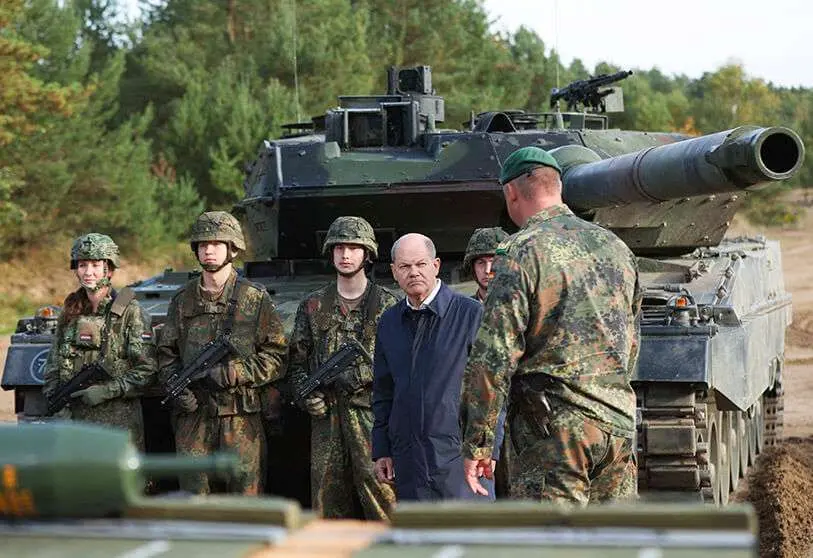Germany softens and will send Leopard battle tanks to Ukraine

There was a lot of reticence in Berlin about sending tanks to Ukraine. The fear of an escalation of violence had raised doubts in Olaf Scholz's government. However, insistent requests from Kiev have finally convinced the German government, which, according to Reuters, will send Leopard 2 tanks to Ukraine to reinforce Zelenski's army. Official confirmation came this morning from German government spokesman Steffen Hebestreit, who said that 14 tanks will be sent to Kiev.
Im Kabinett hat der @Bundeskanzler heute weitere Unterstützung an die #Ukraine mit der Lieferung von #Leopard 2 Panzern angekündigt. Auch Partnerländern wird eine entsprechende Genehmigung erteilt. Das ist eng mit den internationalen Partnern abgestimmt. https://t.co/e31Kf3V1oi
— Steffen Hebestreit (@RegSprecher) January 25, 2023
This German-made tank model is the most widely used in Europe. Moreover, Berlin has the ability to authorise or veto countries from providing these tanks, which is why it was under significant pressure from some allies to allow them to send them to Kiev. One of them, Poland, had made a request to send its Leopard tanks, which, following the Scholz government's decision, is expected to be approved. Reuters itself has reported the German government's intention to give the go-ahead for other countries to deliver tanks to Ukraine.
The German decision is coordinated with that of the United States. A few hours earlier, the Wall Street Journal reported Washington's intention to send its Abrams tanks in what would be an agreement with Germany. Although the official announcement has been made, the delivery of the tanks could be delayed for months, even more than a year. Both the Germans and the Americans have been reluctant to send their own tanks, with the US citing the complexity of maintenance and logistical problems associated with these high-tech vehicles.

From the outset, the Bundestag argued that any shipment should be coordinated with its Western allies. Yesterday morning, German Defence Minister Boris Pistorius and NATO Secretary General Jens Stoltenberg met to discuss the issue of the tanks. At the meeting, Pistorius said that his country was already reviewing the tanks to be sent to Ukraine and that a decision would not be long in coming. He was also keen to point out that his country is one of the biggest military supporters of Kiev.
Some of Volodymir Zelensky's government officials have praised what they see as a possible game-changer in the war. Zelensky is getting the support he has long sought and lobbied the West for, saying that 'the need is greater' at the moment. All this despite fears in European countries of a possible escalation of the war, which the Kremlin has been quick to warn of.

Anatoly Antonov, Russia's ambassador to the United States, has called the dispatch of US tanks "another blatant provocation". Indeed, Russia believes that, after this military aid, the war could turn into a "global catastrophe". Antonov believes that "it is obvious that Washington is deliberately trying to inflict a strategic defeat on us", although he says that "US tanks will be destroyed by our army in the same way as all other NATO equipment samples are being destroyed".
All this comes against the backdrop of Ukraine's turmoil over the sacking of a large number of senior officials in Zelenski's government. According to the president, a number of internal problems had to be solved, corruption being one of the most important. A few days before the Ukrainian leader dismissed more than a dozen top officials, a deputy minister was arrested on suspicion of corruption, accusations denied by the Ministry of Defence.

Despite the protests that began to surface in the wake of this event, Vlodimir Zelensky has opted to make what is so far the biggest revolution in the Ukrainian government since the war began on 24 February 2022. "Any internal problems that interfere with the state are being solved and will be solved," Zelensky explained. He added that "this is fair, it is necessary for our protection and it helps our rapprochement with European institutions", in a further step towards Ukraine's long-awaited goal of EU membership.








